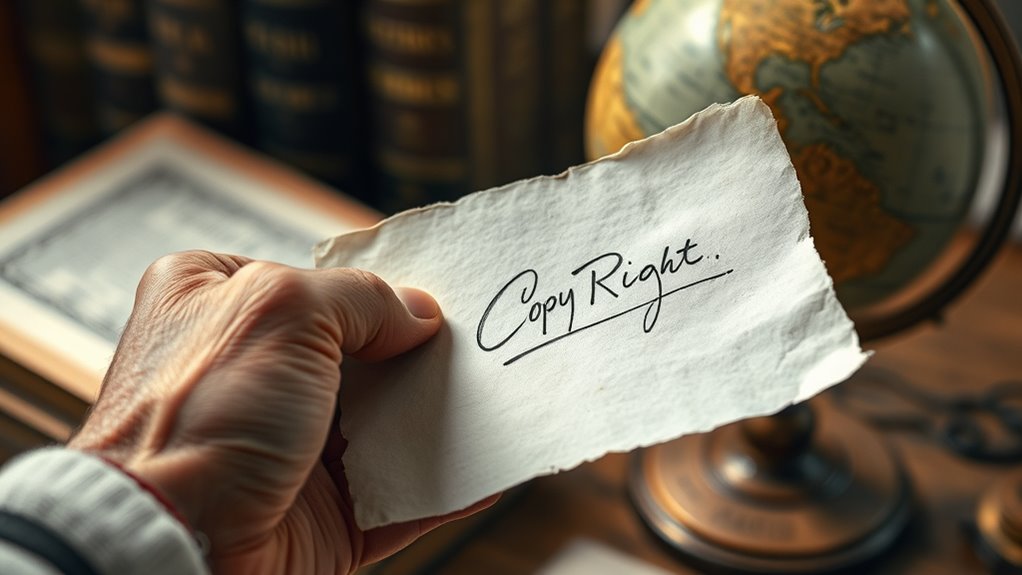Understanding moral rights in international copyright law means recognizing how these rights protect your personal connection to your work, including your right to attribution and control over use and modifications. These rights vary widely across countries, with some recognizing them as inalienable and others allowing waivers. Knowing how different legal standards work is essential to safeguarding your reputation and creative legacy worldwide. If you continue exploring, you’ll gain a clearer picture of how to navigate these complex protections.
Key Takeaways
- Moral rights protect an artist’s personal connection, reputation, and integrity of their work across different countries’ legal systems.
- Key moral rights include attribution, preventing misrepresentation, and maintaining the work’s integrity.
- Legal recognition of moral rights varies internationally; some are inalienable, others can be waived in specific contexts.
- Understanding jurisdiction-specific laws is essential for artists and rights holders to effectively enforce moral rights globally.
- Enforcement mechanisms differ across countries, requiring artists to be aware of legal standards and protections in each jurisdiction.

Moral rights are fundamental principles that protect an artist’s personal connection to their work, guaranteeing they retain control over how it is used and presented. These rights emphasize the importance of maintaining the integrity and reputation of the artist, even after their work has been sold or transferred. When you create a piece of art or a creative work, your moral rights give you a say in how your work is shown, whether it’s displayed publicly, reproduced, or altered. One key aspect of moral rights is artist attribution, which means you have the right to be recognized as the creator of your work. This right ensures that your name is properly associated with your art, preventing others from claiming authorship or misrepresenting your involvement. Proper attribution isn’t just about recognition; it’s about safeguarding your reputation and the integrity of your creative expression. High critical acclaim and box office success often reinforce the importance of moral rights in protecting an artist’s reputation and legacy.
In many jurisdictions, moral rights are considered inalienable, meaning you can’t simply waive them if you choose. However, in some countries, artists can sign moral rights waivers, which legally relinquish certain rights, often in the context of commercial use or specific projects. These waivers are typically negotiated and carefully drafted, as they can limit your control over how your work is later used or modified. It’s crucial to understand that waiving moral rights might mean losing the ability to object to distortions, modifications, or certain uses that could harm your reputation. Additionally, the international variation in moral rights protection means you should be aware of specific legal standards when distributing your work across borders. Understanding these differences is essential if you’re creating or distributing work across borders. You should also pay attention to the enforcement mechanisms available in different jurisdictions to effectively uphold your rights internationally. Being informed about moral rights laws in each country can help artists better protect their creative legacy worldwide.
Frequently Asked Questions
How Do Moral Rights Differ Between Countries?
You might notice that moral rights, like artist recognition, vary between countries due to cultural differences. Some nations emphasize an artist’s connection to their work, granting them rights to attribution and integrity. Others may prioritize the work’s societal value over individual recognition. These differences mean you should research each country’s laws to understand how moral rights are protected and how cultural values influence these rights, ensuring proper respect and legal compliance.
Are Moral Rights Transferable or Inheritable?
You might wonder if moral rights are transferable or inheritable. Generally, moral rights protect your artist attribution and creative integrity. In most countries, these rights are non-transferable and stay with you even if you sell the work. However, in some jurisdictions, certain rights may be waivable or inheritable through inheritance laws. This means your moral rights often remain linked to you, emphasizing your moral connection to the work and safeguarding your artistic integrity.
Can Moral Rights Be Waived or Waived Permanently?
Imagine a voice that whispers your moral rights, soft yet persistent. You can waive your moral rights, but only within certain moral rights exceptions, and this waiver isn’t always permanent. The moral rights duration varies by jurisdiction, sometimes lasting a lifetime, other times ceasing after a set period. While waivers are possible, they’re often limited, and some moral rights remain inviolable, echoing your personal connection to your work.
How Do Moral Rights Influence Copyright Enforcement?
You see that moral rights, like artist attribution, directly influence copyright enforcement by ensuring creators are recognized and their integrity protected. These rights often last for the moral rights duration, meaning enforcement can extend over time. When moral rights are upheld, it becomes easier to defend against unauthorized use or alterations, helping creators maintain control and reputation. Ignoring these rights can weaken enforcement and diminish the creator’s moral claim.
What Are the Limitations of Moral Rights Internationally?
You might think moral rights are universal, but they have significant limitations internationally. Many countries don’t recognize artist attribution or moral rights duration equally, making enforcement tricky. For example, some nations restrict moral rights after a certain period or don’t acknowledge them at all. This inconsistency can undermine artists’ control over their work, highlighting the challenge of protecting moral rights across different legal systems worldwide.
Conclusion
By understanding moral rights, you realize how they protect your personal connection to your work, shaping its integrity and your reputation. These rights remind you that creativity isn’t just about profit but about preserving your voice and values across borders. As you navigate international copyright law, you see that moral rights are more than legal clauses—they’re a reflection of your identity, a safeguard that, when respected, guarantees your art remains true to your vision, no matter where you are.









